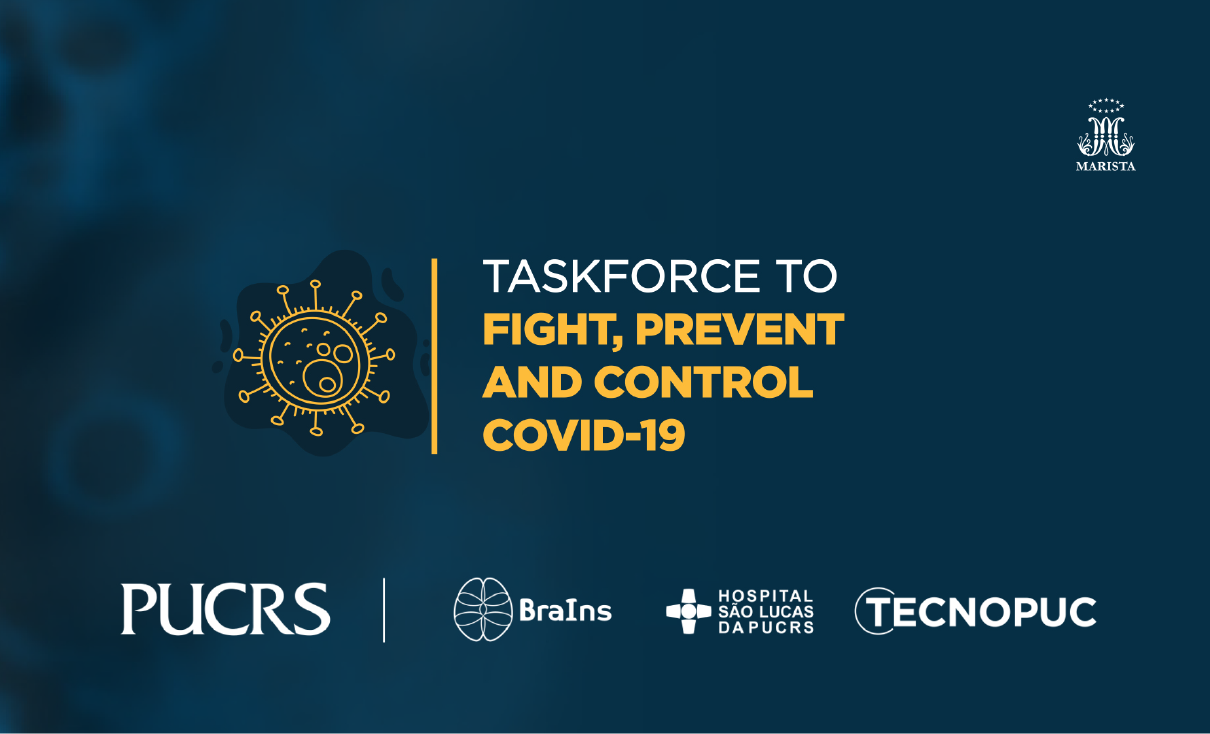Over 50 professionals and researchers from different areas joined effort to find solutions for pandemic
 More than 50 professionals and researchers from PUCRS, including professors from School Of Medicine, School of Health and Life Sciences, School of Humanities, School of Technology, Brain Institute of RS (BraIns), Science and Technology Park (Tecnopuc) and São Lucas Hospital have joined forces to find solutions to different issues involving the new pandemic Coronavirus (Covid-19).
More than 50 professionals and researchers from PUCRS, including professors from School Of Medicine, School of Health and Life Sciences, School of Humanities, School of Technology, Brain Institute of RS (BraIns), Science and Technology Park (Tecnopuc) and São Lucas Hospital have joined forces to find solutions to different issues involving the new pandemic Coronavirus (Covid-19).
The initiative is intended to advance a refined technical and scientific contributions for the state of Rio Grande do Sul, in view of all the uncertainties associated with the behavior of the infection and the treatment of Covid-19.
Some of the emerging measures announced by the group are the availability of University structures, such as BraIns laboratories, for molecular diagnostics and the search for faster and lower cost diagnoses, studies of possible drugs with a computational approach using cell culture, assistance to the telemedicine system for the State of Rio Grande do Sul, possible use of advanced therapies such as autologous cell therapy and analysis through geospatial intelligence.
The group is now alert and available to discuss preventive measures for the population and health professionals, studies of cellular and molecular mechanisms, as well as support for reference centers in the diagnosis of suspected cases.
According to the Senior Vice President of PUCRS and coordinator of the task force, Dr. Jaderson Costa da Costa, “the time has come for us to seek strategies and actions based on available scientific evidence and research that we will develop so that short-term results can contribute to sustaining the progression of this pandemic and thus protect our society ”.
The task force consists of working groups that meet different demands generated by the expansion of the virus. Check out more about them.
1. Data / Intelligence: seeks to advance management strategies in health analytics, using geospatial, artificial intelligence and digital platforms.
2. Molecular / Experimental: the goal is to develop a cheaper and more agile methodology for detecting the coronavirus, aiming to meet major demands in the area of diagnosis.
3. Diagnosis: aims to provide a rapid molecular diagnosis of the new Coronavirus to support doctors’ decisions, especially at the São Lucas Hospital of PUCRS.
4. Treatment: seeks to investigate the possibility of repositioning known antiviral drugs. These are drugs that can assist in the treatment of COVID-19 patients. It also seeks to evaluate stem cells therapy: step in silico / in vitro, step with stem cells and Studies / Clinical Trials.
5. Cell therapy: the main goal is to conduct a short-term phase I clinical trial for the standardization, safety, feasibility and efficacy of autologous bone marrow stem cell transplantation in patients infected with Coronavirus, admitted to Hospital São Lucas, who develop severe acute respiratory symptoms. It comprises professors and researchers with experience in cell therapy, cell and molecular biology, radiology and respirology. The group is committed to the development of innovative and therapeutic strategies, through an effective and safe methodology of advanced therapy as a tool for the treatment of infected patients who do not respond to conventional therapies. In another segment within the group, an in vitro testing platform will be built to investigate the main mechanisms and study the development of possible sequelae caused by Covid-19.
6. Remote medical / mental health care: seeks to connect mental health professionals to provide voluntary care for those on the front line against Covid-19.
7. Tecnopuc IDEIA Labs: develops prototypes and Personal Protection Equipment (PPE), such as masks, valves and respirator components, as well as other equipment models for healthcare professionals.
8. Impact on children: the objective of this group is to study the impact of COVID and quarantine on children’s cognitive and behavioral aspects, especially in children with developmental disorders, during the pandemic and after. The group consists of child neurologists, psychiatrists, psychologists and educators. The group will be working on research projects in several areas, from research at the molecular level and stress markers, to issues of influence on sleep, academic and behavioral changes.
9. Brain and Covid-19: neurological, neuropsychological, structural and functional evaluation of the brain of patients affected by severe Covid-19 infection
10. Startups: aims to monitor the COVID-19 actions and projects of Tecnopuc startups.
11. Elderly and Covid-19: the taskforce will evaluate the social conditions, dependence, vulnerability, nutritional parameters, emotional aspects, and the management of chronic diseases during the pandemic and the impacts of social restriction on the elderly. It will rely on the Institute of Geriatrics and Gerontology (IGG) and a multidisciplinary team of researchers from PUCRS to identify elderly people who are more susceptible to developing serious infections through various sociodemographic parameters, as well as cellular and molecular biomarkers.
In one of the groups, the activities associated with individual safety equipment, some results have been obtained. In addition to the face masks that have been produced and delivered to several institutions in Porto Alegre, the group is working on the technical analysis of the production of valves and components for respirators at Tecnopuc’s Fablab. In addition, it is working on the development of a protection capsule (dome) to protect health professionals who work with Covid-19 patients.
Coordinator: Dr. Jaderson Costa da Costa
Data / Intelligence (Regis, Brito and Rafael)
Diagnosis (Saulo)
Molecular-experimental (Daniel)
In silico / in vitro (Allan, Matheus and Osmar)
In vivo (Gabriele)
Clinical trial (Nathalia and Graciane)
Mental Health (Rodrigo)
Labs Tecnopuc IDEIA (Jorge Audy)
Elderly (Douglas)
Brain / Neurology (Mirna and Nathalia)
Startups (Flávia)